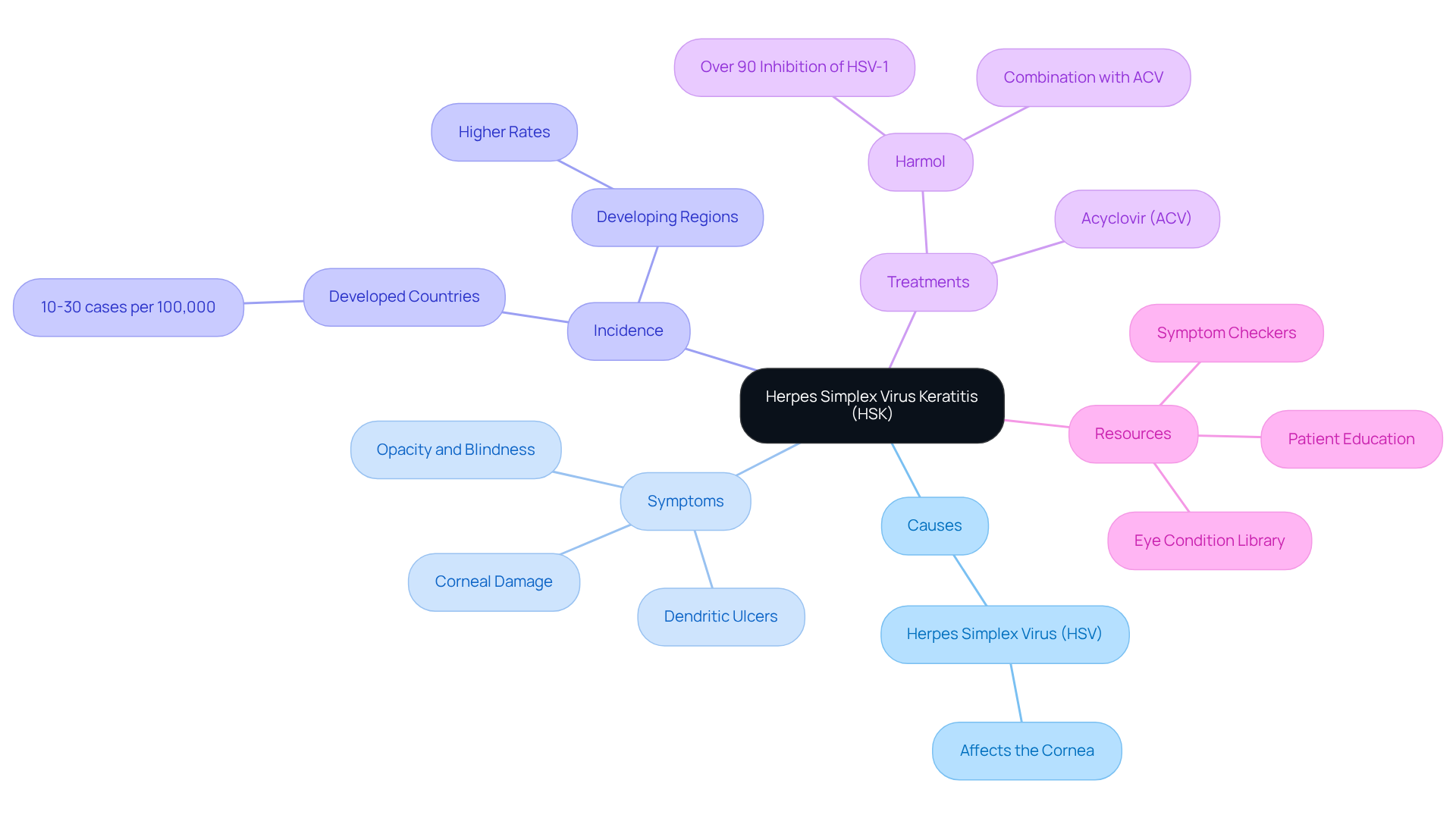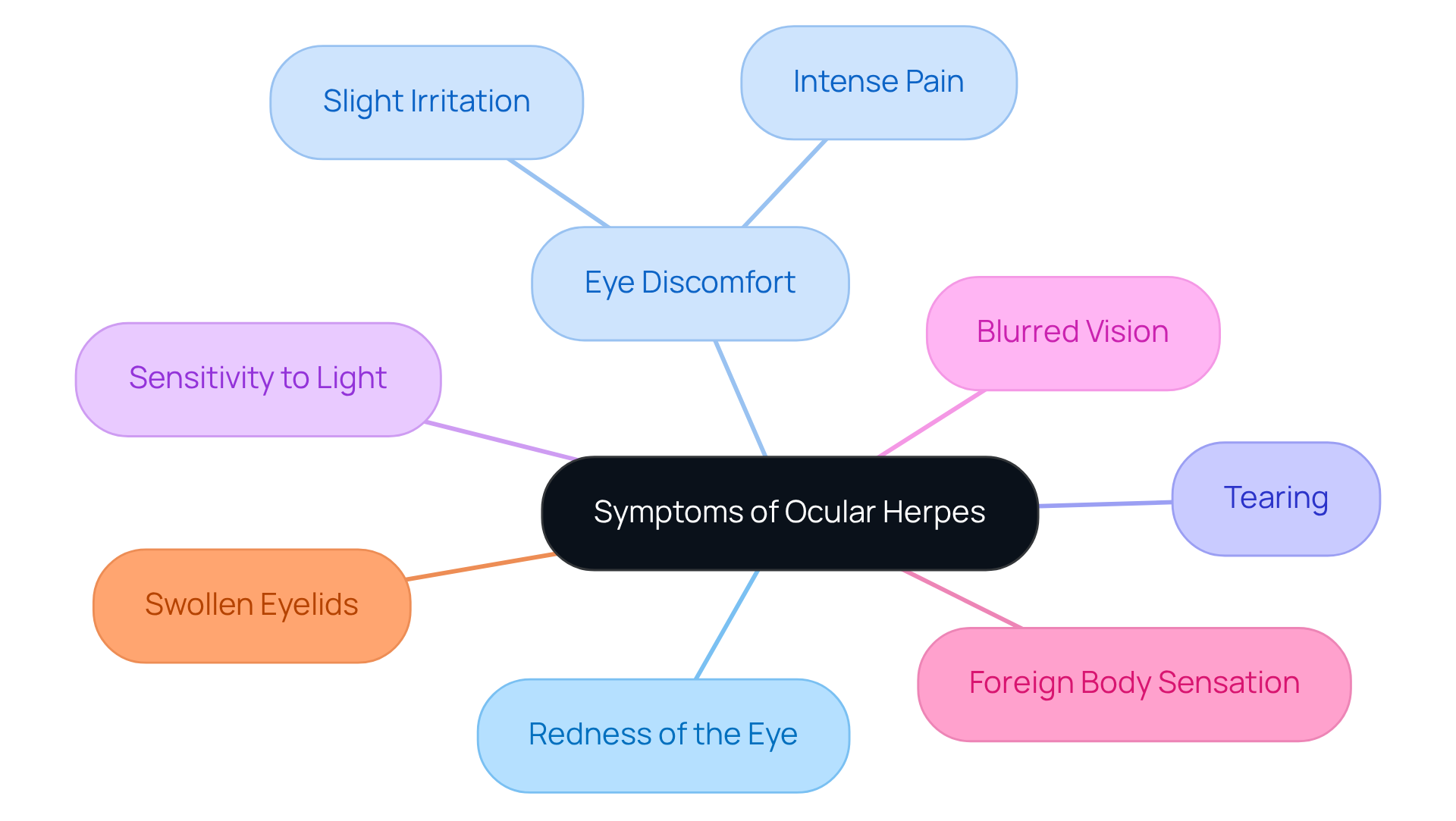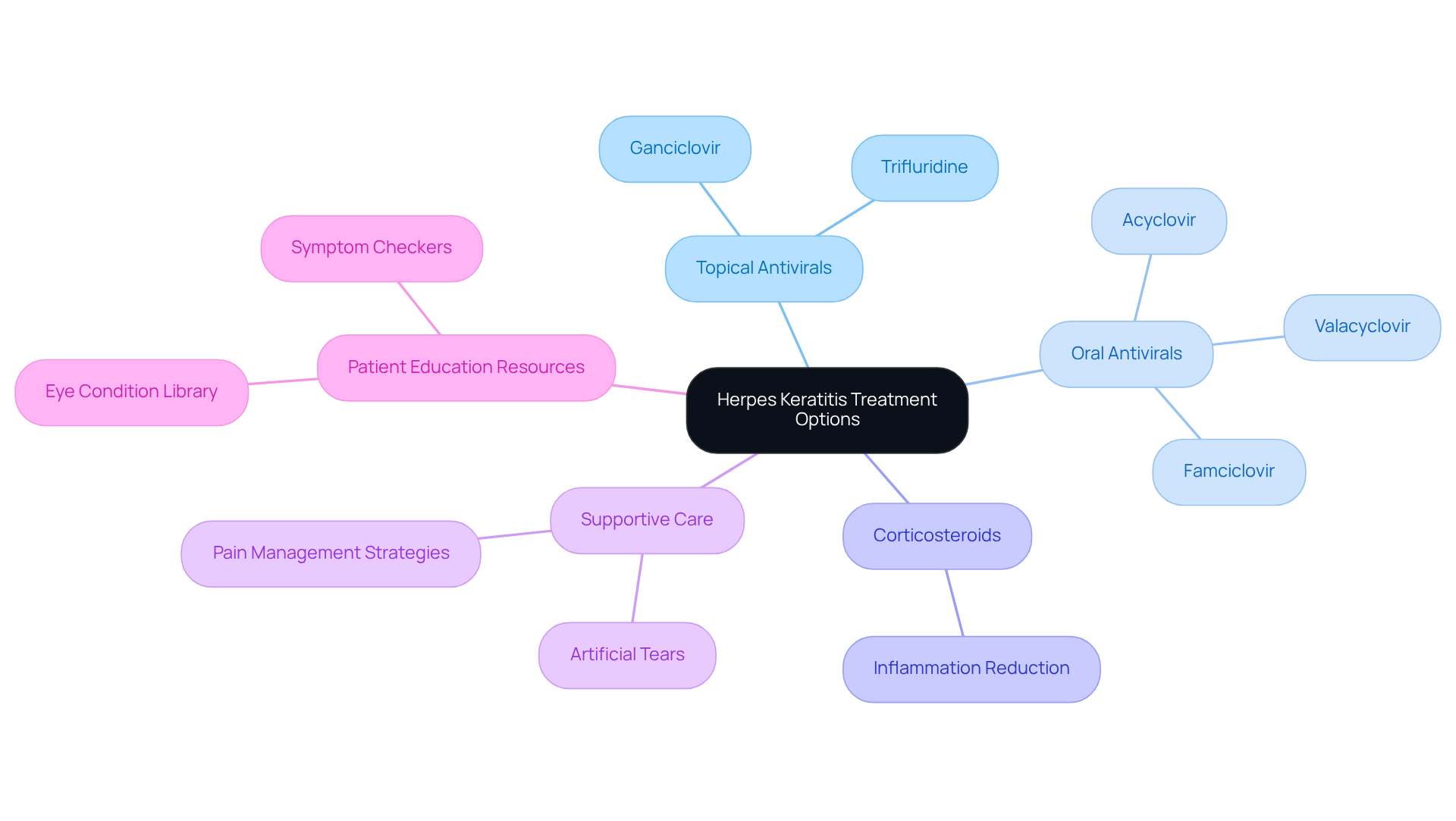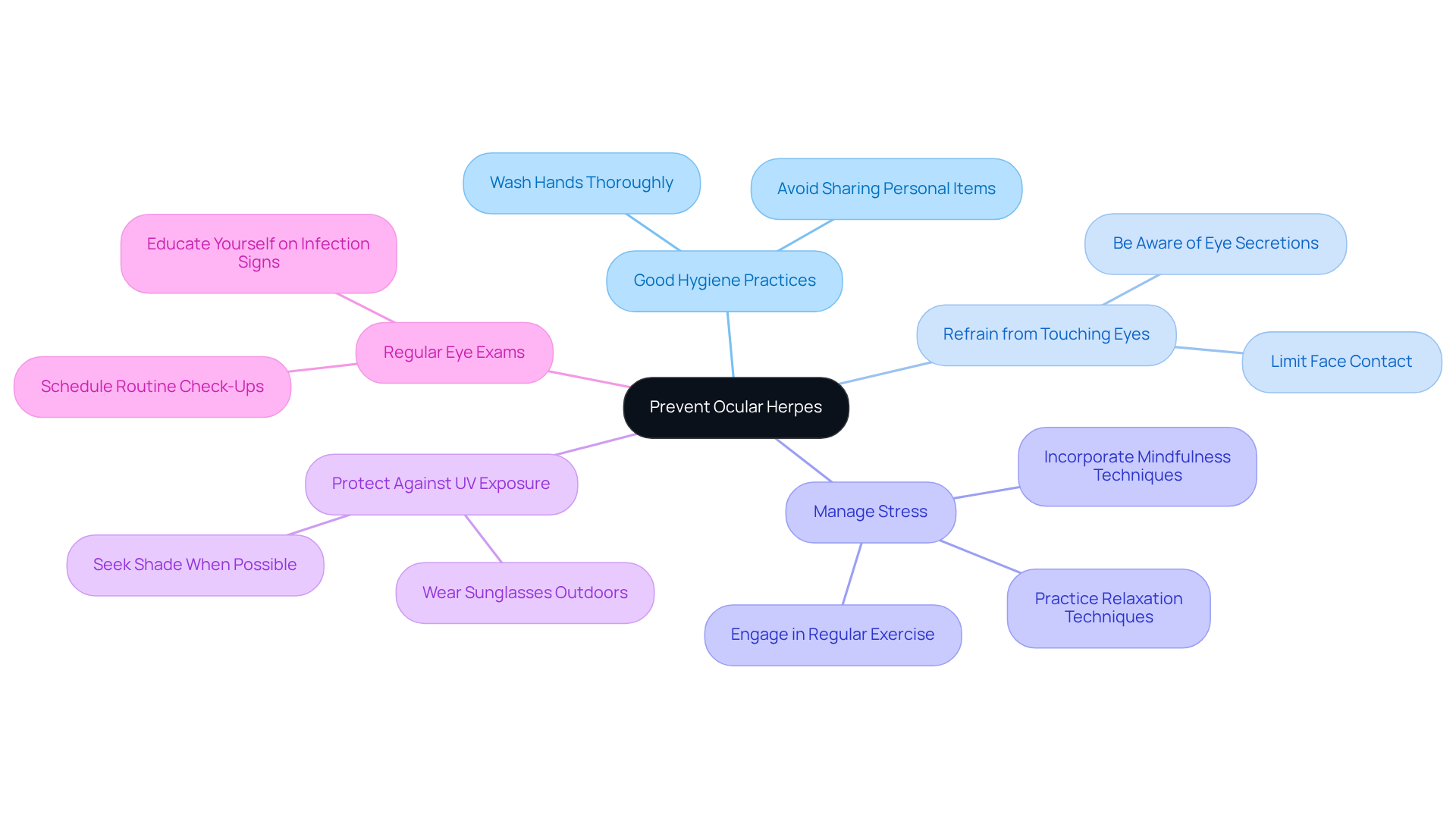Posted by: Northwest Eye in General on July 30, 2025
Overview
Herpes in the eye, known as Herpes Simplex Virus Keratitis (HSK), is a serious condition that can lead to vision loss if not treated promptly. We understand that experiencing symptoms like redness, discomfort, tearing, and blurred vision can be concerning. Early recognition and intervention are crucial, and we want to assure you that there are effective treatment options available.
- Antiviral medications can help manage the symptoms and reduce the risk of outbreaks.
- Additionally, adopting preventive strategies, such as maintaining good hygiene and attending regular eye exams, can significantly contribute to your eye health.
- Remember, you are not alone in this journey, and we are here to help you through the process.
Introduction
Herpes Simplex Virus Keratitis (HSK) is a condition that can understandably evoke significant concern due to its potential to cause serious eye complications, including vision loss. We recognize that understanding this eye infection is crucial, as it affects many individuals worldwide, with varying incidence rates across different regions.
It’s common to feel anxious about the symptoms, which can often be mistaken for less severe issues. The challenge lies in recognizing them early and seeking timely treatment.
What steps can one take to effectively manage and prevent this condition, ensuring optimal eye health and clarity of vision? We are here to help you through this process.
Define Herpes Simplex Virus Keratitis
Herpes in the eye, known as Herpes Simplex Virus Keratitis (HSK), is an eye condition that can understandably cause concern. It is caused by the herpes simplex virus (HSV) and primarily results in herpes in the eye, which affects the cornea, the clear front surface of the eye. If not addressed promptly, this condition can lead to severe complications, including vision loss. We understand that facing such a diagnosis can be overwhelming.
HSK is characterized by recurring issues, with epithelial keratitis being the most common type. This type is distinguished by dendritic ulcers on the cornea, which can be alarming to see. In developed countries, the incidence of HSK ranges from 10 to 30 cases per 100,000 individuals, with even higher rates noted in developing regions. It’s common to feel anxious about these statistics, but knowing the facts can empower you.
If left untreated, herpes in the eye can lead to corneal damage, opacity, and even blindness. This underscores the critical importance of and timely medical intervention. The standard treatment for HSK is acyclovir (ACV), which plays a vital role in managing the infection. Recent studies have also highlighted the potential of innovative treatments, such as harmol, which has shown over 90% inhibition of HSV-1 replication. This offers hope for improved management of this condition.
Additionally, resources like the Eye Condition Library and symptom checkers at Northwest Eye are available to help you understand your condition better and seek appropriate care. We are here to help you through this process. Comprehending the key traits and challenges of HSK is crucial for you to pursue suitable treatment and avert long-term visual impairment. Remember, you are not alone in this journey.

Identify Symptoms of Ocular Herpes
Symptoms of herpes in the eye can manifest in various ways, and we understand that early recognition is vital for effective treatment and prevention of complications. Common symptoms include:
- Redness of the eye: This is often accompanied by irritation, signaling a potential infection.
- Eye discomfort: It’s common to feel unease that varies from slight irritation to intense pain. Studies suggest that approximately 50-70% of people report eye discomfort as a primary symptom.
- Tearing: You may notice increased tear production, which can be a response to irritation or infection.
- Sensitivity to light (photophobia): Bright lights may cause discomfort, making it challenging for you to engage in daily activities.
- Blurred vision: Your vision might become cloudy or distorted, impacting your ability to see clearly.
- Foreign body sensation: Many patients describe a feeling as if something is lodged in the eye, which can be distressing.
- Swollen eyelids: Inflammation around the eye area may be present, indicating an underlying issue.
Recognizing these symptoms early is crucial. Untreated HSV keratitis can lead to serious complications, including corneal scarring and potential vision loss. Regular consultations with an eye care professional are essential, especially for those at higher risk, such as contact lens wearers. We encourage you to adopt appropriate daily practices, such as diligent hand washing before eye contact and utilizing only recommended eye drops, to and avoid ailments. Additionally, demographics such as females and individuals with multiple sexual partners are at a higher risk for herpes in the eye, highlighting the need for vigilance in recognizing symptoms. Remember, we are here to help you through this process.

Explore Treatment Options for Herpes Keratitis
Caring for herpes in the eye, which is related to herpes simplex keratitis, primarily involves antiviral medications that can be administered topically or orally, depending on the severity of your condition. We understand that navigating this can be challenging, so here are some common treatment options:
- Topical antivirals: Medications like ganciclovir or trifluridine are applied directly to the eye, effectively targeting the virus right where it’s needed.
- Oral antivirals: For more severe cases or recurrent infections, oral medications such as acyclovir, valacyclovir, or famciclovir may be prescribed to help manage the virus throughout your body.
- Corticosteroids: These can be used alongside antivirals to reduce inflammation, but it’s important to approach their use with caution to avoid potential complications.
- Supportive care: This includes pain management strategies and the use of artificial tears to ease dryness and discomfort associated with the condition.
At Northwest Eye, we recognize that early intervention with the right treatment is vital in minimizing the risk of complications, including herpes in the eye, corneal scarring, and vision loss. Our commitment to patient education is evident through resources like the Eye Condition Library and symptom checkers, empowering you to manage your condition effectively. Positive reviews from our patients reflect the personalized solutions we offer, ensuring that your unique needs are met. By prioritizing timely medical intervention and utilizing advanced treatment options, you can maintain optimal eye health and benefit from Northwest Eye’s esteemed reputation for excellence in eye care.

Implement Prevention Strategies for Ocular Herpes
Preventing ocular herpes involves several key strategies that can significantly reduce the risk of outbreaks and complications. We understand that managing your eye health can be concerning, but taking proactive steps can offer reassurance and protection.
- Good hygiene practices: It’s essential to thoroughly wash your hands before touching your face or eyes, especially if you have cold sores. This simple act can prevent the transfer of the , the primary cause of ocular herpes.
- Refrain from touching the eyes: Avoiding contact with your eyes decreases the chance of spreading the virus from other parts of your body, thus lowering the risk of illness.
- Manage stress: We recognize that stress can trigger outbreaks, making it vital to incorporate stress-reduction techniques into your daily routine. Mindfulness, exercise, or relaxation practices can improve your immune response and reduce the frequency of outbreaks, as noted by the Brazilian Society of Hypnosis.
- Protect against UV exposure: Wearing sunglasses outdoors not only shields your eyes from harmful UV rays but also helps prevent flare-ups that can be exacerbated by sun exposure.
- Regular eye exams: Routine check-ups with an eye care professional are crucial for monitoring your eye health. These visits allow for early detection of potential issues, ensuring timely intervention if necessary. Education about the signs of infection is vital for early treatment and minimizing risks.
By adopting these preventive measures, you can significantly lower your risk of developing herpes in the eye and its associated complications. Remember, we are here to help you through this process, leading to better overall eye health.

Conclusion
Herpes Simplex Virus Keratitis (HSK) is a serious eye condition that requires prompt attention and understanding. We recognize that dealing with HSK can be overwhelming, and this article aims to illuminate the critical aspects of this condition, from its symptoms and treatment options to effective prevention strategies. Understanding the urgency of early intervention can significantly impact how we manage HSK and protect against potential vision loss.
Throughout our discussion, we highlighted key symptoms such as:
- Eye redness
- Discomfort
- Tearing
- Sensitivity to light
It’s common to feel uncertain when experiencing these signs, which is why awareness is so important. The treatment landscape for HSK includes:
- Antiviral medications, both topical and oral
- Supportive care to alleviate discomfort
Additionally, preventive measures, like good hygiene practices and regular eye exams, are essential components in reducing the risk of outbreaks.
Ultimately, understanding HSK is vital for maintaining eye health and preventing complications associated with this condition. By prioritizing education, timely medical intervention, and proactive prevention strategies, you can take charge of your eye health. We are here to help you through this process. Empowerment through knowledge and access to resources can lead to better outcomes and a brighter future for those affected by herpes in the eye.
Frequently Asked Questions
What is Herpes Simplex Virus Keratitis (HSK)?
HSK is an eye condition caused by the herpes simplex virus that primarily affects the cornea, the clear front surface of the eye. It can lead to severe complications, including vision loss, if not addressed promptly.
What are the common symptoms of HSK?
HSK is characterized by recurring issues, with the most common type being epithelial keratitis, which features dendritic ulcers on the cornea.
How prevalent is HSK?
In developed countries, the incidence of HSK ranges from 10 to 30 cases per 100,000 individuals, with even higher rates observed in developing regions.
What can happen if HSK is left untreated?
If left untreated, HSK can lead to corneal damage, opacity, and even blindness, emphasizing the importance of early recognition and timely medical intervention.
What is the standard treatment for HSK?
The standard treatment for HSK is acyclovir (ACV), which is essential in managing the infection.
Are there any new treatments for HSK?
Recent studies have highlighted innovative treatments, such as harmol, which has shown over 90% inhibition of HSV-1 replication, offering hope for improved management of HSK.
Where can I find more information about HSK?
Resources like the Eye Condition Library and symptom checkers at Northwest Eye are available to help you understand your condition better and seek appropriate care.






